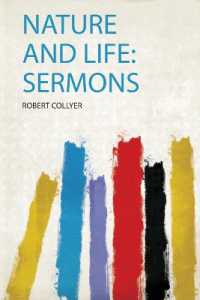Full Description
Family and Community Partnerships: Promising Practices for Teachers and Teacher Educators, offers a fresh new look at the competencies, strategies, and practices that effective educators develop to build strong partnerships with families and communities. Written by leaders in the field, the book is an outgrowth of a cutting-edge initiative led by the National Association for Family, School, and Community Engagement to reimagine how educators are prepared for family and community engagement. Based on four guiding practices - reflect, connect, collaborate, and lead alongside families - each section of the book highlights theory, real-world strategies, discussion questions, and activities that can be used by teachers, teacher educators, and professional learning specialists to inspire new ideas for courses, workshops, and for self-reflection.
Contents
Foreword; Karen L. Mapp.
Editor's Note; Reyna Hernandez and Margaret Caspe.
Introduction: Reflect, Connect, Collaborate, Lead: Family Engagement Core Competencies; Margaret Caspe and Reyna Hernandez.
Section I: Reflect.
Chapter 1. It's Not Another Thing To Do, It's Another Way To Be; Anne T. Henderson.
Chapter 2. Preparing Novice Teachers through Cultural Educators and Real-Life Teacher Experiences; Patricia J. Norman and Beth R. Giles.
Chapter 3. Growing in Critical Cultural Awareness: Understanding Ourselves to Strengthen Our Work With Children, Families and Communities; Yasmin Morales-Alexander.
Chapter 4. Opening Minds to the Power of Partnerships With Families Through Online Learning Modules; Katherine T. Ratliffe, Caryl H. Hitchcock, and Polly J. Quigley.
Section II: Connect.
Chapter 5. Culturally Responsive and Sustaining Relationships With Families; Joanna D. Geller and Danielle M. Perry.
Chapter 6. Creating Connections With Families of Young Children Using Trauma-Informed Approaches; Shulamit Natan Ritblatt, Audrey Hokoda, and Felicia V. Black.
Chapter 7. Building Relationships With Families Through the Tribal Home Visiting Program; Deborah Roderick Stark.
Chapter 8. Family Engagement in the Digital Age: Relationships First; Susan K. Walker, Malina Her, Tatiana Jara Pacheco, and Lila Khan.
Chapter 9. Afterschool and Summer Partnerships; Jillian Luchner.
Chapter 10. Preparing Educators to Build Interprofessional Relationships Through Case Stories; Gloria Miller and Darcy Hutchins.
Section III: Collaborate.
Chapter 11. Family Stories: Collaborating to Promote Family Literacy; Patricia A. Edwards, Marliese R. Peltier, and Leah Porter.
Chapter 12. Mothers as Co-facilitators of Mathematics Learning Experiences; Marta Civil, Fany Salazar, Maria Hernandez, Silvia Mata, and Lorena Murdock.
Chapter 13. A Multi-Generational Approach to First Generation College Success; Betsy Nikolchev, Carmen Meza-Ponce, and M. Elena Lopez.
Chapter 14. Transforming Learning and Student Outcomes Requires Co-Construction With Families; Araceli Simeón, Teneh Weller, Yolande Beckles, and Rosa RiVera Furumoto.
Chapter 15. Family as Faculty in a Special Education Teacher Preparation Course; Cristina Santamaría Graff.
Section IV: Lead Alongside Families.
Chapter 16. Building a Better Table: Families and Communities as Architects of Imagination in Teacher Education Reform; Wilisha Scaife, Eva Zygmunt, and Kristin Cipollone.
Chapter 17. Focus on Families: Strategies for Developing Preservice Teachers' Capacity for Effective Family Engagement; Michele Myers and Anthony Pittman.
Chapter 18. Parent Perspectives on Leadership; Bianca Scott, Lora Evans, Rosazlia Grillier, Hayward Mclain, Lisa Mosko Barros, Matthew John Rodriguez, Zully Rodriguez, Julia Sosa, Alice Clark, Caroline Rose, and Cecilia Liang.
Chapter 19. Teacher Leadership: Improving Family Engagement Practices and Policies; Weadé James.
Chapter 20. Promoting Family Engagement Through CAEP Standards; Banhi Bhattacharya and Malina Monaco.
Chapter 21. Leading for More Inclusive Communication; Rebecca Bauer and Helen Westmoreland.
Afterword; Vito J. Borrello.
About the Authors.







